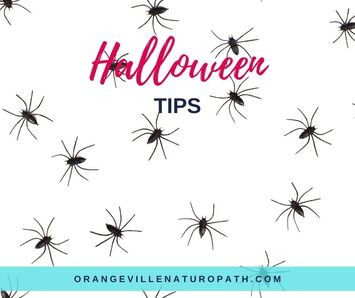I find that moving from the dessert fix of Thanksgiving into a candy free-for-all at Halloween can trigger sugar cravings that you had successfully managed earlier in the year. Sugar is addictive. Consuming sugar releases dopamine and opioids, making you feel good and causing you to go back for more. Not everyone is susceptible to the cycle of sugar dependency, but it's certainly quite common. Many of you find it easier to avoid sugar altogether and stop the craving cycle, but this is a process that also requires eating a balanced diet and usually some other support.
For kids, we often see behaviours pop up (our biggest way of knowing that things are off with our children) when their blood sugar is yo-yoing.
It's important to note that sugar consumption also reduces the function of white blood cells, shifts the microbiome (GALT - gut associated lymphoid tissue), and replaces intake of more beneficial nutrients. These are all factors that influence immune function, something that we are all thinking about right now. Sugar consumption can depress immune function for up to 6 hours.
Here are my tips for wellness around Halloween.
1. How much sugar are you eating?
Those little chocolate bars add up, but so do sources of hidden sugars. Read your food labels to know where else you might be consuming sugar without even knowing. The other day at the grocery store I found sugar in a can of diced tomatoes, a jar of salsa, in gluten free bread, and 3 different kinds of sugar in granola bars (I didn't buy any of them). If you eat sugar, it's way more fun to get it from a cookie than it is from a glass of juice, in my opinion. Plus, eating sugar unknowingly adjusts your taste buds to tolerate more of it.
2. Balance macronutrients
In order to keep your blood sugar more stable, add protein close to your sugar consumption to slow the spike. A handful of nuts or seeds nearby would be helpful. Also, trying to consume protein and fat with each meal, especially breakfast, will maintain blood sugar levels all day. I find that eating a carby or sugary breakfast makes me want sugar in the afternoon for a pick-me-up when my energy crashes. For kids, have them eat celery or an apple dipped in peanut or almond butter before diving into the candy bags.
3. Know yourself
If you don't tolerate sugar well, or know you easily become dependent on it, don't keep it around. If you or your kids get "hangry" (grumpy from hunger) you might need to work on blood sugar regulation. Furthermore, getting tired two hours after eating is a sign that your blood sugar isn't well regulated, or you may have insulin resistance. I often like to test three different markers in blood work to understand how your body manages sugar: fasting blood sugar, HbA1c, and fasting insulin. Keep in mind that I like to keep people in optimal range, which means we deal with issues before they become diseases as much as possible. Prevention is key! If you think you have issues dealing with blood sugar, try to eat more often and ensure your meals contain a mix of protein, fat, and complex carbohydrate. I find kids especially can be dependent on a carb-based diet, so try to increase their proteins and fats.
4. Other dopamine boosters
Since sugar can activate the reward pathways through dopamine, you can also work on boosting dopamine in other ways. Exercise, sleep, listening to music, meditation, eating protein (especially tyrosine - almonds, eggs, bananas, avocados, beans, chicken), avoid alcohol, optimize vitamin D levels, take probiotics, etc. - there are plenty of options.
(Side note, cell phones and social media are addictive because of their relationship to the dopamine pathway as well, these same dopamine boosters can be helpful.)
5. Consider micronutrients
Zinc and selenium, in particular, have crucial roles to play in immune function. (And they're also great for the thyroid). A diet that includes a range of nutrients leaves the body more supported and less likely to send out signals for more food and sugar. Nuts, seeds and leafy greens are an excellent way to get micronutrients. Brazil nuts are especially high in selenium, and pumpkin seeds are a great source of zinc.
6. Keep moving
As a colleague of mine said, "You are one workout away from a good mood." This isn't about punishment or working off calories. Exercise, or movement of any kind, is an under-utilized tool in our medicine cabinet. Before opening the snack cupboard, try going for a walk first and seeing if that impacts your food choices. Reward yourself with things that aren't food to break food habits.
For more tips on managing Halloween and sugar overload with kids, click here.
I'm going to be releasing a fall detox program shortly. The goal is two-fold this year, to rebalance dietary choices with a focus on immune function and also to build connection since I find November is often a challenge for people. Please let me know if you are interested.
Have a Happy Halloween!
Dr. Christa

 RSS Feed
RSS Feed